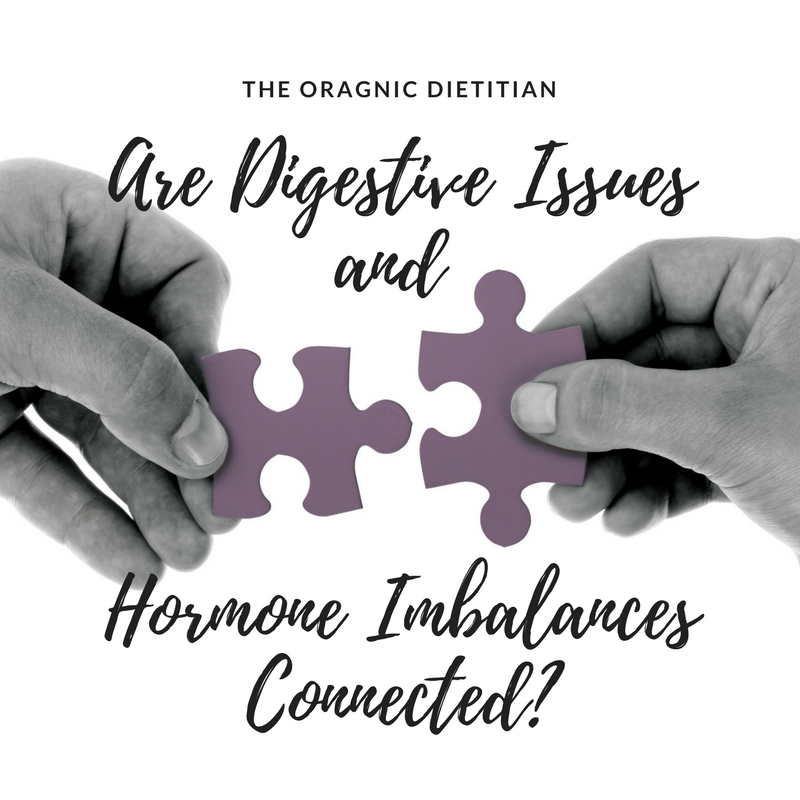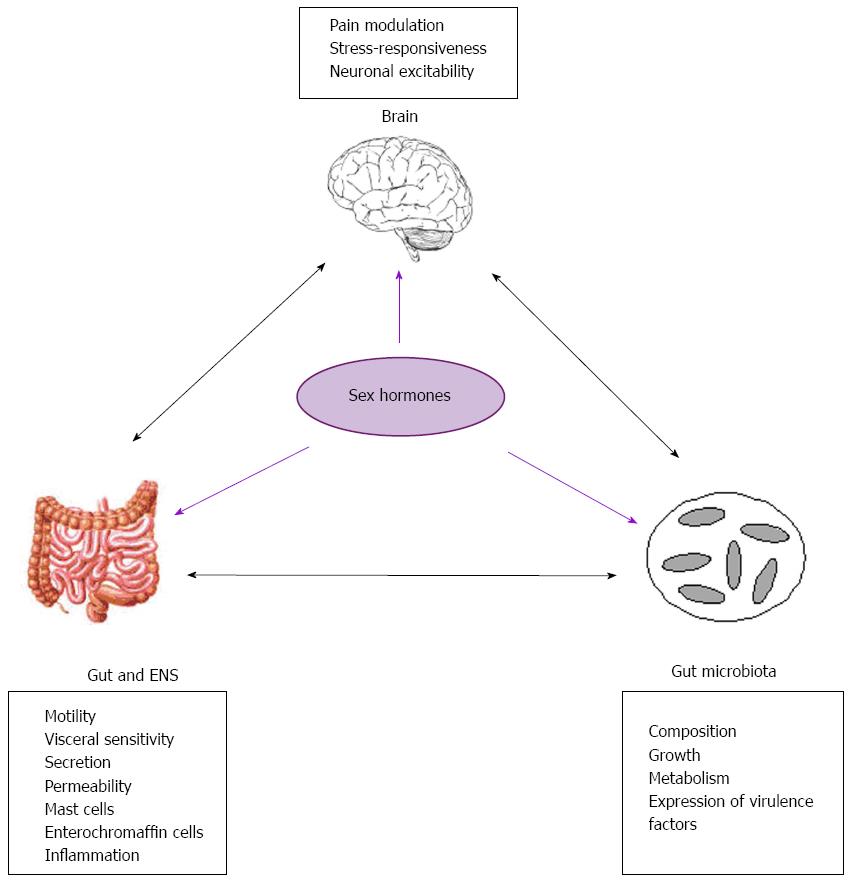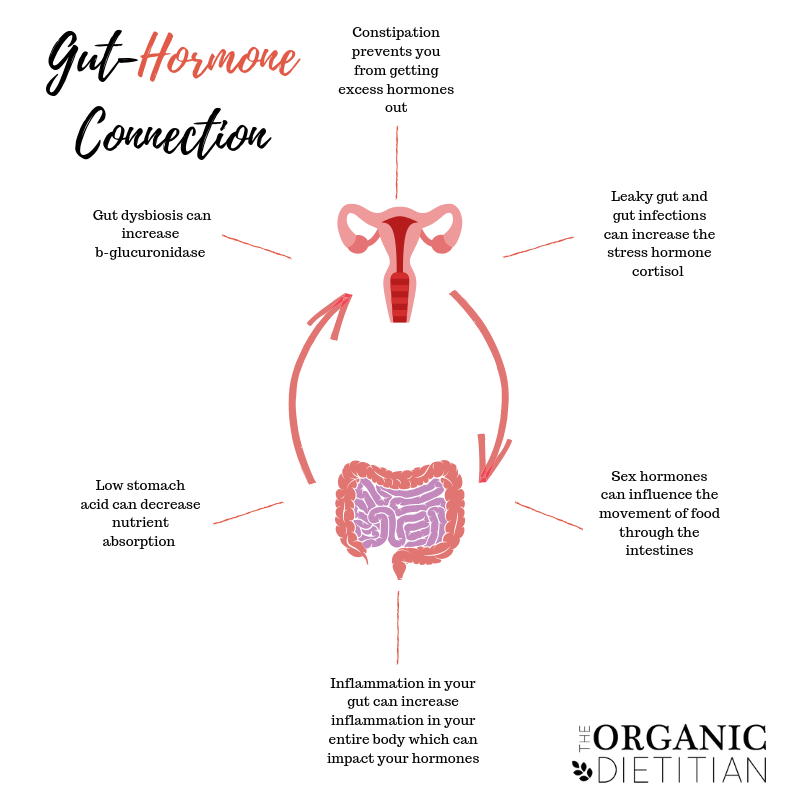27 October, 2017
Are Digestive Issues and Hormone Imbalances Connected?

The short answer to the question, “Are digestive issues and hormone imbalances connected?” is…YES!
I recently posted something about the relationship between digestive issues and hormone imbalances on my Instagram page and got a lot of response. The fact that so many people responded only confirms my suspicions that many women are dealing with both digestive issues and hormone imbalances. Just about every woman I work with in my practice has symptoms of both. Health issues usually do not stem from a single factor. My clients often say they are eating clean and feel like their diet is great, so why are they feeling so crappy? A well-working digestive system and endocrine system (for hormones) are signs of good health. Achieving this goes beyond good nutrition.
 A compromised digestive system can start at birth and be influenced by everything that happens over a lifetime. Being born via a C- section, being bottle fed (4, both of which may not always be avoidable), taking antibiotics, eating processed food, stress, medication, and toxins are just some of the things that can contribute to poor gut health over time. I don’t know about you, but I grew up in a time when processed food was in, antibiotics were handed out like candy, and being under lots of stress was considered normal. These things take a toll on your gut health!
A compromised digestive system can start at birth and be influenced by everything that happens over a lifetime. Being born via a C- section, being bottle fed (4, both of which may not always be avoidable), taking antibiotics, eating processed food, stress, medication, and toxins are just some of the things that can contribute to poor gut health over time. I don’t know about you, but I grew up in a time when processed food was in, antibiotics were handed out like candy, and being under lots of stress was considered normal. These things take a toll on your gut health!
How do you know if you have digestive issues?
Sometime symptoms aren’t even present or can show up in subtle ways. The typical signs include constipation, diarrhea, abdominal pains, bloating, excess or smelly gas, excessive burping, skin issues like eczema, acne, rashes, or psoriasis, and food intolerance’s. Other unusual symptoms might include headaches, mood swings, fatigue, coughing, sinus congestion, agitation, anxiety, depression, autoimmune conditions and more. Whether these symptoms show up regularly or occasionally, these symptoms can be a sign of a compromised digestive system. The test way to know for sure is with a good stool test. You know I am a fan of testing and not guessing which is why I run the GI MAP on every single one of my clients.
How are hormone imbalances connected to the digestive system?
The microbiome (bacteria in your gut) plays a big role in our hormones. Good bacteria can metabolize and recycle hormones in your body. Estrogen, for example, circulates the body and when it reaches the liver is inactivated. In a normal functioning digestive system, this inactivated estrogen is then sent to the intestines where it can be excreted in stool. But if certain bad bacteria are present in your gut, the bacteria can reactivate estrogen and release it back into your body where it continues to circulate and can cause estrogen dominance. (1)
Glucuronidation is one of the major phase 2 detoxification pathways in the liver that helps us eliminate hormones from the body. An enzyme called beta glucuronidase can block this detoxification process, which can cause your hormones (including estrogen) to get reabsorbed, reactivated, and put back into circulation. Beta glucuronidase is produced by imbalanced intestinal bacteria.
So to address the cause, you need to lower this enzyme by balancing your gut bacteria. Sorry to say it but simply taking a probiotic is usually not enough to re-balance the gut. Get a good stool test, like the GI MAP, to address bacterial overgrowth. The nice thing about the GI MAP is that it actually tests for the beta glucuronidase enzyme.

When your digestion is working well and things are moving smoothly (if you know what I mean) excess hormones like estrogen can be excreted out of the body in your stool instead of being reabsorbed. The inability to properly excrete hormones can lead to problems like excess circulating hormones. The body then senses that free circulating hormones are elevated and then will shut down the ability to make new hormone. Constipation can contribute to hormone imbalances but on the flip side, hormone imbalance can also contribute to constipation, making for a vicious cycle. Don’t know if you are constipated? See my post all about what a healthy poop looks like. It is a common problem!
Many people today are also dealing with low stomach acid and can be experiencing heartburn, GERD, or undigested food in their stool. Your stomach acid helps to digest proteins, fats, and carbohydrates. The process of breaking down these macronutrients makes the micronutrients (vitamins and minerals) available for hormone production. Many nutrients are important for health hormones including zinc, magnesium, B vitamins, and so much more. If you aren’t digesting properly, breaking down food well, or even poorly absorbing nutrients, your hormones can suffer.
Leaky gut (also know known as intestinal permeability) is when the junctions (or space) between the cells of your digestive system lining remain open allowing toxins, microbes, and undigested food particles to leak into your bloodstream. This leakiness is a stressor and can raise cortisol (your stress hormone), produced in the adrenal glands. When stress is high, the body puts priority on trying to deal with that stress instead of on your other hormones. (2) To make a long story short, leaky gut is a form of stress which increases cortisol and can lead to other hormone imbalances.
Your gut is also where the majority of your immune system is located. So when your gut is suffering it can increase inflammation which can trigger inflammation everywhere in your body. Inflammation will absolutely impact your hormones.
Sex hormones themselves can influence the digestive system. Imbalances of estrogen and progesterone can influence the movement of food through the intestines. They can either speed up the process (causing diarrhea, nausea and abdominal pain) or they can slow things down (causing bloating or constipation). Altered estrogen levels can cause hyper-responsiveness to stress, which may promote an immune response and contribute to leaky gut. (3)
As you can see, the digestive system and our hormones are closely linked. In my own practice I have observed the connection between hormones and digestive health. My clients typically are dealing with both and we work on healing hormone and digestive systems through supplements, eating a balanced diet, supporting the liver and the bodies natural detox mechanisms, getting adequate sleep, reducing stress, and much more.
ARE YOU READY TO INVEST TIME, ENERGY, AND MONEY TO GET TO THE ROOT PROBLEM OF YOUR HORMONE AND DIGESTIVE SYSTEMS SO YOU CAN FEEL GREAT AGAIN? CLICK THE BUTTON BELOW TO REQUEST A FREE 30 MINUTE DISCOVERY CALL…
As a registered dietitian and Functional Diagnostic Nutrition Practitioner, I help clients get proper functional lab testing, assist in the process of reading those results using clinical correlation (treating the patient and not just the test results), and give them proper tools (diet, supplements, and lifestyle) to start the healing process.










